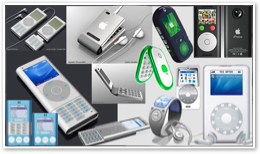

Macworld: Scorecard and Secrets of the iPhone
As delicious as it is to see my ideas for the Generation 6 iPod leap of the page and into a real product with even more functionality than I could have imagined, the really interesting bits of Apple's latest releases are the things that were not predicted at all, or which turned out completely different than expected.
Here's a look at how things turned out compared to expectations, and why any of it matters.
Macs: Right
A number of people were expecting a new Mac for Macworld, but as I'd pointed out, there's only really room for two big announcements, and the Apple TV had to be one of them.
I presented why an ultralight laptop didn't make much sense for Apple, and that the existing Mac lineup was still pretty fresh from a round of updates last fall.
Macs: Wrong
As it turned out, there was even less said about Macs than I'd imagined. No CS3 demo, and no belabored cheerleading about how many new Macs Apple has sold.
This is interesting because it demonstrates that Apple has more going on than simply its alternative to the Windows PC. Apple even dropped "computer" from its name, signaling its intent to increasingly expand beyond its role as a PC maker.

This isn't reflective of poor Mac sales; the opposite is true: Apple has sold far more Macs in the last quarter than it has since the 2000 tech bubble.
Other areas the company branches off into will bring it new customers with reasons to consider buying a Mac. I think the existing "iPod Halo" for Macs will look minor in comparison to the effects of the new iPhone.
iWork, iLife, and .Mac: Right
This one is easy to concede: nobody correctly predicted that Apple would break tradition and not even mention new Mac applications at Macworld. It seemed like a given.
How and why did the company not stop to collect another $79 from every Mac user this year? It's a puzzle.
iWork, iLife, and .Mac: Wrong
Not only did Steve Jobs spend all his time onstage talking about Apple TV and the new iPhone, but the show didn't even showcase new versions in passing. In fact, the Apple booth was demonstrating iLife 06 as if a new year had never even rolled in.
In the months following Macworld, Apple has in the past quietly trotted out speed bumps to its product lineup, but it seems like a new version of iLife and iWork--not to mention the incessant rumors of a new spreadsheet--demand a bit more dog and pony than a simple press release.
Will Apple entirely skip a year's generation of iLife, following the example of Microsoft Office, which only gets overhauled every couple years or so? Fat chance. I can't imagine that Apple could let an upgrade cycle slip. Certainly, it can't have repurposed its iLife developers to work on the iPhone.
Perhaps a spring event will tie the iLife and iWork suites together with Mac OS X Leopard, and unveil them all under a revised new user interface, the way Microsoft has united the branding of Office and Windows together in the past.
Leopard: Right
Expectations for more new information on Leopard also turned out to be "a swing and a miss," despite seeming obvious before the show. I can take some credit for highlighting "new and improved Notes integration for iPods," although the iPhone's new integration and capacity is far beyond what I had imagined.
Apple is demonstrating Leopard features in its Macworld booth, but I haven't sat through the hour long presentation so I can't report if anything new is being shown. If you note anything that hasn't been show publicly before, please let me know.
Leopard: Wrong
Of course, no mention of Leopard in the keynote, no real attention at the show, and no new ship date all add up to a big difference in what I--and many others--were anticipating.
Still, it makes sense that Apple focus on a couple big items rather than push out so many new boxes that none really stand out or get the attention they deserve.
Clearly, Apple didn't feel like it needed to show off its alternative to Windows Vista as much as it needed to demonstrate how serious it is about destroying the remains of PlaysForSure, Xbox Live, and the Zune marketplace, and signaling its clear intent to eviscerate the struggling Palm and Windows Mobile.
In an interesting inside look at the iPhone, Lev Grossman of Time Magazine quotes Jobs as describing Windows Vista as "just a copy of an old version of Mac OS X."
Perhaps Apple thinks Tiger has no problem in competing solo against Vista for another few months.
Recall that Vista was rushed out to have something to show against Tiger; that scramble has resulted in early reports of significant problems, leaving egg on the faces at Redmond.
Having a year long head start in game consoles with the Xbox 360 didn't allow Microsoft to outsell the existing PlayStation 2, so there doesn't seem to be any point in rushing Leopard to market before its ready.
iPod, Phone, iTV: Right
I think I was right about surmising that Apple's contribution to a mobile phone is far beyond just the ability to play iTunes music. Apple released everything I'd described in the iPod Pro and the iPod Blogger rolled into one.
In describing both, I imagined them being the same hardware marketed toward two different groups: business users and the youth market.
As it turns out, the iPhone appears to aim at both. It has the high quality camera, chat functions, and media playback of the Blogger, along with the enhanced contact, web, mail, and messaging features of the Pro. That gives the new iPhone broad appeal in a single, universal unit.
I had expected more information about iPod software, and was largely right about how Apple is tending a new platform. However, I didn't expect to see a phone based on Mac OS X. That means the iPhone won't play the existing iPod games, but it does open the door for more software.
Apple is pointedly describing the iPhone as a closed platform. That means that just like the iPod, there won't be a way to copy your own apps onto the unit and run them. All apps will come through Apple and be sold through iTunes, very similar to how Apple is now selling games for the 5G iPods.
iPod, Phone, iTV: Wrong
I would have bet big money against Apple's iPhone using Mac OS X; fortunately, I did not have the opportunity.
However, being based on Mac OS X doesn't mean that standard apps will run on it; the demos of the iPhone's version of Safari are quite obviously specially designed to accommodate its smaller screen.
It is also likely that the iPhone uses a hardware architecture very different from the standard Core Duo processor and the other chipsets in a full size Mac. After all, Mac OS X is highly portable and already runs on multiple platforms, as Apple demonstrated in the transition to Intel.
Further, major chunks of Mac OS X are not even necessary on a phone device. For example:
-
•with no disk drive, it doesn't need the elaborate caching Mac OS X does to speed everything up
-
•without overlapping windows, it has no need for Mac OS X's double buffering overhead
-
•it has no need for elaborate font rendering or a printing architecture
-
•it doesn't have to support a variety of hardware devices or scan for changes in hardware
So why did Apple bother to use Mac OS X on the iPhone? I had expected Apple to build its phone on top of Symbian. Of course, I also didn't think the iPhone would be such a sophisticated device.
There is obvious value in reusing existing code from Mac OS X; it allows Apple to apply its existing technologies, such as advanced power management, and then share improvements to enhance both Macs and the iPhone.
As for applications such as Safari, the front end code isn't very useful, but the underlying rendering engine is.
From that perspective, there are large swaths of functional code--parts of which may be open source--that can be reused behind a new front end adapted to the iPhone's smaller screen.
Of course, from the marketing side, being able to describe the iPhone as being based on Mac OS X allows Apple to reinforce the brand value of the Mac to every iPhone user. Apple expects to sell ten million iPhones by next year; that's more than the number of Macs the company is likely to sell in the same period.
Basing the iPhone on its own platform will more than double the installed base of Mac OS X, allowing Apple to reinvest twice the development efforts into improving the iPhone and making better desktop and laptop Macs as well. The more use code sees, the more refined it becomes.
It also makes the iPhone much more difficult to copy, because it gives Apple an advanced foundation to begin work upon; knockoff manufacturers can copy hardware designs, but copying sophisticated software is much more difficult.
Next Articles:
This Series


 |
|
 |
|
 Del.icio.us |
Del.icio.us |
 Technorati |
About RDM :
:
Technorati |
About RDM :
:

Wednesday, January 10, 2007








 Send Link
Send Link Reddit
Reddit NewsTrust
NewsTrust






